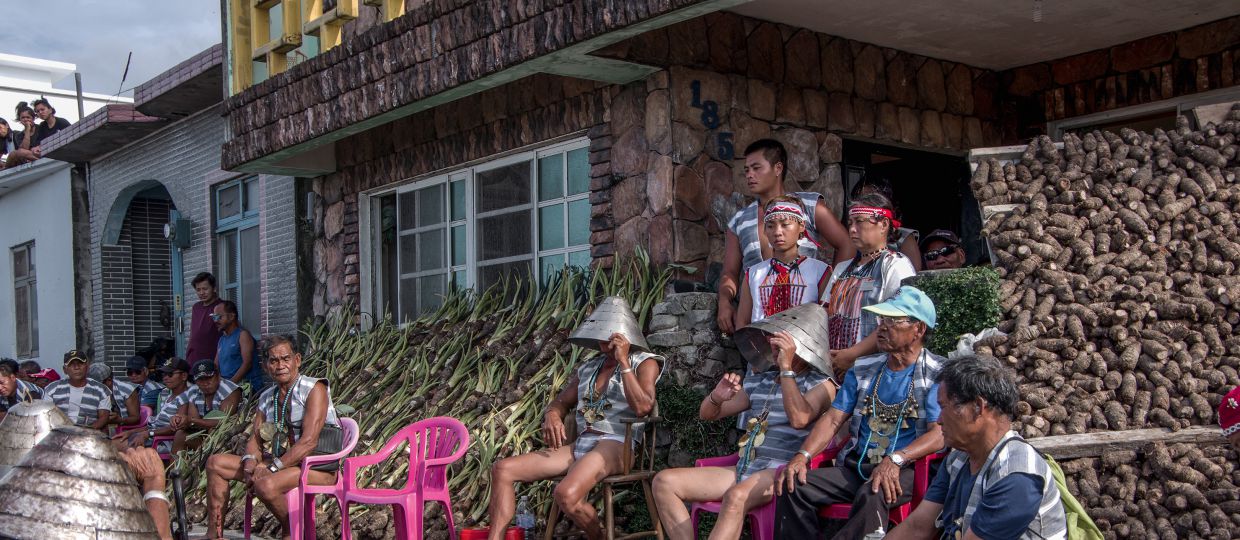An artistic research project sponsored by the Austrian Science Fund
People – Creativity – Solidarity – Inspiration
What motivated an Austrian composer and a musician from Taipei to work together with the Tao, an indigenous community on Orchid Island (Lanyu)? Was it curiosity? Was it fascination with a wonderful island—or with a style of singing so specific and special that Western musical notation is incapable of capturing it? Was it a search for inspiration?
Since 2005, the violist Wei-Ya Lin (who has since also become an ethnomusicologist) and Johannes Kretz (a composer specialised in electronic sound production) have been paying regular visits to the Tao community. They collect songs, do interviews, and attempt to understand the connection between singing and the lives of the Tao people. An upshot of these activities was a research project that led to Wei-Ya Lin’s dissertation Musik im Leben der Tao: Tradition und Innovation [Music in the Life of the Tao: Tradition and Innovation] (2015). And Johannes Kretz, for his part, has developed compositions that bring together traditional Tao singing and European contemporary art music.
In 2016, this collaboration led to the realisation of an evening-length dance theatre production entitled Maataw – the floating island at the National Theatre in Taipei. It was a production that presented not only the beauty of Tao life, dance, and music, but also placed a strongly critical, emotional, and rather political emphasis on their social, economic, and ecological concerns.
In 2018, a three-year grant by the Austrian Science Fund (FWF) programme PEEK made possible the next step in the form of the artistic research project Creative (Mis)Understandings – Methodologies of Inspiration at the mdw. The starting point here is the question as to whether understanding is always well suited to bringing people together—and whether, conversely, misunderstandings necessarily always have a separating effect. This project (which began in 2018 and runs until 2021) employs multiple reciprocal visits by the project participants from Taiwan and Austria as well as joint workshops, artistic research, improvisation, composition, and performance in the pursuit of several goals: reinforcing the Tao community’s cultural identity by connecting past and future, softening the break between the generations there, and creating a basis upon which the Tao might be able to prevent their practices from disappearing entirely—perhaps even by means of transforming them in some ways.

Furthermore, composers of European contemporary art music will be developing methodologies that allow them to realise scalable compositions, the musical ideas and content of which can be realised in various manifestations that can be understood and appreciated by listeners in the various respective contexts. Thanks to the FWF’s support, these goals can now be pursued by means of artistic research within a larger team of indigenous and non-indigenous individuals from Taiwan and Austria. Alongside the project heads (Johannes Kretz and Wei-Ya Lin), the core team includes Samu Gryllus, Wolfgang Liebhart, Ming Wang, Hui Ye, Syaman Vongayan (Han name: Chien-Ping Kuo), Si Pehbowen (Han name: Zheng Kuo), Sinan Sakayan, and Chien-Hsiang Lin, who are being supported and advised by Sandeep Bhagwati, Iris ter Schiphorst, Bernd Brabec de Mori, Marc-Antoine Camp, Cheng-Hsien Yang, Tasos Zembylas, Fang-Yi Lin, Chiao-Hua Chang, and Daliah Hindler.
All this will facilitate exploration of the realm between understanding and misunderstanding from various perspectives while more clearly pinpointing its significance in people’s lives. This requires extensive reflection and great sensitivity, as well as the consideration of methodological and ethical issues. Here, we modify our definition of the word “inspiration” to mean: mutually valued, deliberate, and reciprocal artistic influencing on the basis of solidarity. And as part of this process, we absolutely do encourage creative misunderstandings in the interaction between research and artistic practices. After all, both understanding and misunderstanding can lead to positive discoveries and inspiration—not only in the artistic sense, but also in the form of new research questions and socially effective initiatives.
The first two intensive workshop phases, conducted in Vienna (January 2019) and on Orchid Island (August–September 2019), already saw important realisations, experiences, and fields of work emerge: on the basis of field research using approaches from ethnomusicology and artistic research, it proved possible to identify initial areas of Tao repertoire that might be useable both in applied ethnomusicology and for various possible artistic and socio-musical transformations. And initial interventions that brought together the various Tao generations as well as the musicians from Europe likewise led to promising outcomes.
A courtesy song composed by an Austrian, with German lyrics but sung in the Tao style known as Anood at a multi-day Tao house-raising celebration—which elicited three songs of response—opened up starting points for further work together. The discovery of an additional type of Tao singing that had previously gone undocumented by basic research provided new research-relevant knowledge. And a further project, that of developing and offering to the trash collection service on Lanyu a more culturally and aesthetically appropriate alternative to the electronically realised opening bars of Beethoven’s Für Elise, which are the usual acoustic signal of trash collection services in Taiwan, is an initiative that is interesting both in the artistic sense and in terms of cultural policy. At this point, it’s impossible to say how this project’s many elements might eventually be joined to form an overall artistic sculpture (in the sense of Beuys). But some promising initial steps have been taken.
mdw.ac.at/creativemisunderstanding

